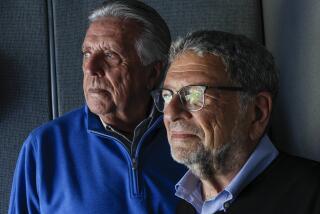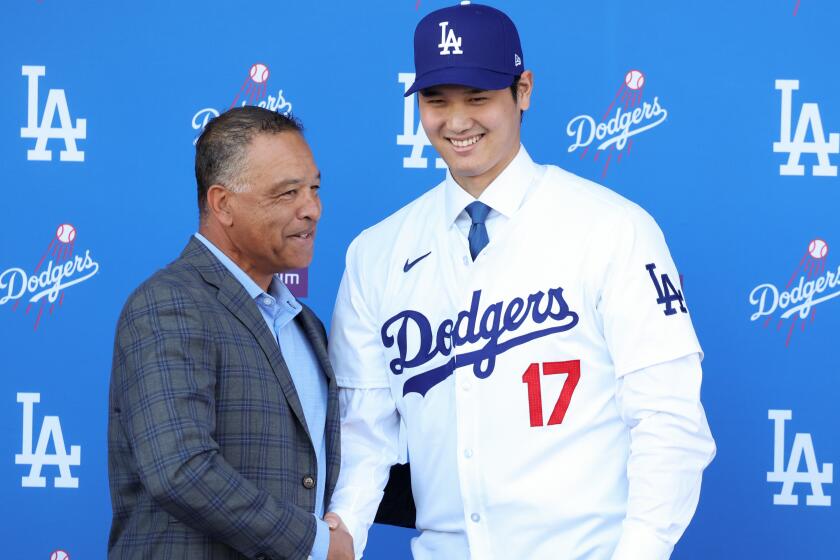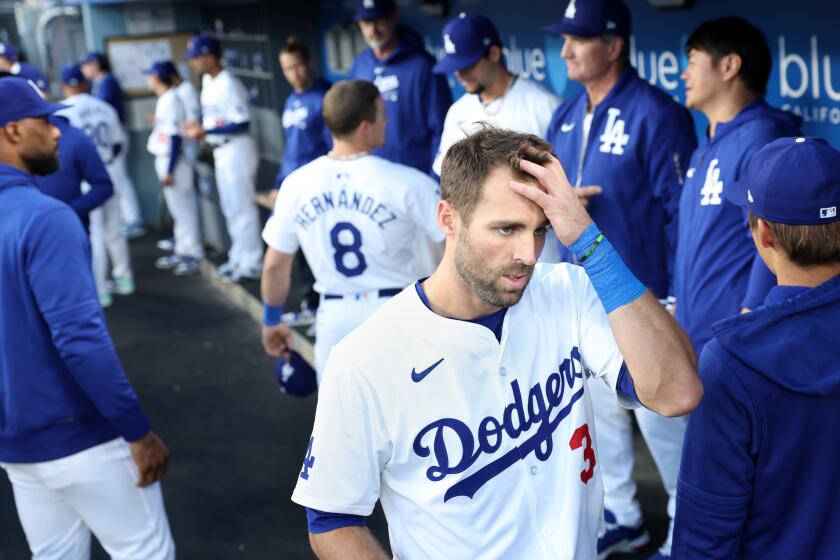He was just happy to have a job in L.A.
Vin Scully, who just completed his 58th season behind the Dodgers microphone, sat down recently in the Dodger Stadium press box to discuss the tumultuous 1957 season -- the Dodgers’ final season in Brooklyn -- and what followed:
Question: Which team did you root for as a kid?
Answer: I was born in the Bronx and raised in an area called Washington Heights. I was able to walk from my grammar school to the old Polo Grounds where the Giants played, so I grew up a rabid Giants fan. Because I was a member of the Police Athletic League and the Catholic Youth Organization, I could go to games free. And if I couldn’t go with either organization, it was 55 cents to sit in the bleachers. I would save soda pop bottles, cash them in and get the 55 cents.
Q: Who was your favorite player?
A: Mel Ott.
Q: Did you ever envision being a baseball announcer in those days?
A: I would sit a million miles away from home plate and look up at that old press box and dream, thinking, “Boy, to be up in that booth.” God willing, it happened.
Q: So as a kid, you never went to Ebbets Field?
A: No, it was too far away. My family never had a car. Never. As a kid, I was always a Giants fan. Confession is good for the soul. First time I ever went to Ebbets Field, I was working a game there.
Q: That was in 1950. When, during that summer seven seasons later, did you realize the Dodgers were really, truly leaving?
A: There was constant talk. People who were far more informed than I made me believe it was serious. I was shocked, pure disbelief.
My first concern, to be honest, was, “Am I going to go with them?” I didn’t want to lose my job. There was a great deal of pressure, I understood, on [owner] Walter O’Malley to hire someone like Bob Kelley or Tom Harmon or any of the other fine announcers out here. But he was adamant that he was bringing his broadcasters with him, me and Jerry Doggett. Had he weakened and decided to try and make a good impression by going with Southern California announcers, I would have been out of a job.
Still, I was leaving my family, and all my friends. The only plus was that I was going to get married the following February, so I was going to start a new life anyway. But it was kind of a shaky feeling to leave everything that I knew. I was a little scared that I wouldn’t be accepted in Southern California.
By that time, I had at least been accepted in New York. You know, it takes a while. The best thing I had going for me was that New York had so many Southern announcers, Mel Allen from the South, Red Barber from the South, Russ Hodges from the South, Ernie Harwell from the South. And here is this kid who played stickball in the streets and I think people kind of hoped I would do all right. I think that was a little extra push that I had.
So, I was split in half. I wanted to stay, but I needed the job. There weren’t very many jobs like mine. And while it was sad to leave, the overwhelming relief that Mr. O’Malley would take me to L.A., that overpowered everything.
Q: What do you remember about the last game at Ebbets Field?
A: I remember Danny McDevitt was our pitcher and I remember the Dodgers won, but it was extremely gloomy.
We had an organist and she had a little brown bag with her with something in it to drink, I assume. As she got sadder, the music reflected it. That set the mood. It was a very sad night.
When I walked out of there, I thought, “Wow, I’ll probably never come back here again.”
Q: Were you surprised at how long the bitterness lingered in New York over the departure of the Dodgers, at how, even to this day, Walter O’Malley remains the target of so much animosity?
A: It breaks my heart that he’s not in the Hall of Fame. My gosh, if ever anyone changed the face of baseball, it was him. I’m disappointed because the villain of the piece was Robert Moses [New York city official in charge of urban renewal]. Walter O’Malley was going to build a domed stadium designed by Buckminster Fuller. I saw [a model] of it. It was unbelievable. It would have revitalized the borough of Brooklyn. Moses, for ego or whatever other reason, demanded that the team play in Queens. Mr. O’Malley said, “We are not the Queens Dodgers. We are the Brooklyn Dodgers.” He was really pushed out.
It’s amazing he takes all the heat. No one even talks about Horace Stoneham [owner of the then-New York Giants]. He was going to go to Minneapolis. It was Walter who told him he’d be better off going to San Francisco. There was a natural rivalry and it made a lot of sense.
Q: Had you ever been to L.A. before the Dodgers came here?
A: I was in the Navy and I wound up being stationed in San Francisco. And a buddy of mine was in the Marine Corps, stationed at Camp Pendleton. We would meet in L.A. We’d walk down Hollywood Boulevard looking for movie stars. We were so young, we didn’t know what we were doing.
Q: What was it like when you returned as the Dodgers’ lead announcer?
A: The Dodgers had a plane and a bunch of us -- Roy Campanella, Gil Hodges, Pee Wee Reese, Duke Snider and a couple of others -- flew out in October of ’57 for a big welcome party. There were a thousand people at the airport welcoming us.
I was still living at home back in New York, and I remember, a few months later, my mother, Bridgett, coming into my room crying early in the morning. “I’ve got terrible news,” she said. She had heard on the radio that Campanella had had the automobile accident [which paralyzed him]. So he was not going to come out here as a player.
Q: What do you remember about that first Dodgers game at the Coliseum in 1958, a game against the Giants that drew 78,672?
A: It was overwhelming. I had never seen a crowd like that. The roar was the thing I had always loved, going back to when I was 8 years old.
Back then, on Saturday afternoons, I would listen to college football on network radio. We had a great big radio that stood on four legs. I would crawl under it with a pillow so the speaker was directly over my head. It didn’t make any difference who was playing. When somebody scored and the crowd roared, that sound came down like water from a shower head and I would get goose bumps. Wow, did I want to be there.
I was very fortunate because, around the time we arrived in Los Angeles, the transistor radio became really popular. That turned out to be a great break for me. I realized I was really talking to the crowd. It kind of helped my style, because I’m not so much an announcer as just a guy talking to you.
Q: Have you ever been back to the site of Ebbets Field?
A: No, never went back. I’m not much for going back. I’ve always looked ahead.
--
More to Read
Are you a true-blue fan?
Get our Dodgers Dugout newsletter for insights, news and much more.
You may occasionally receive promotional content from the Los Angeles Times.






